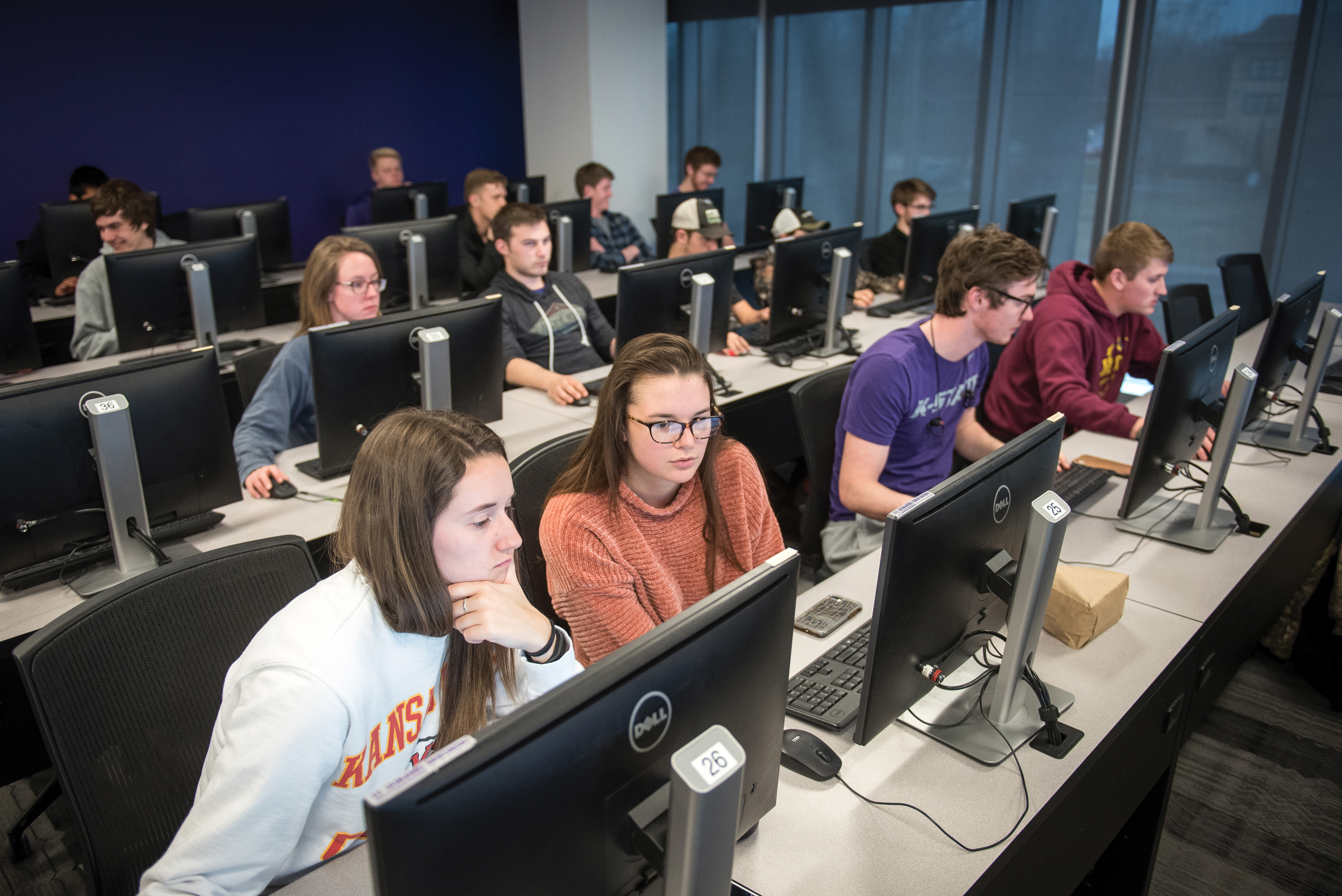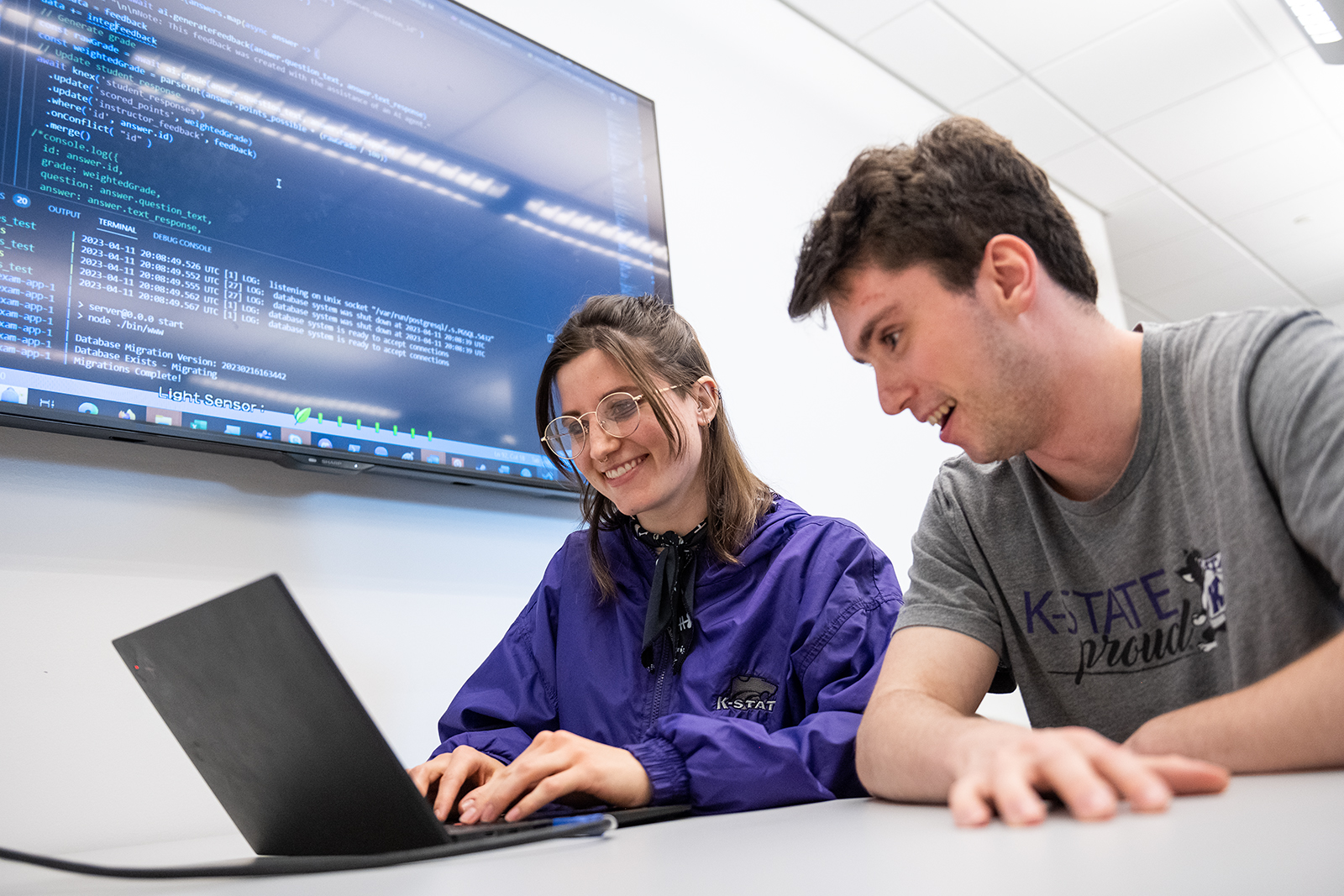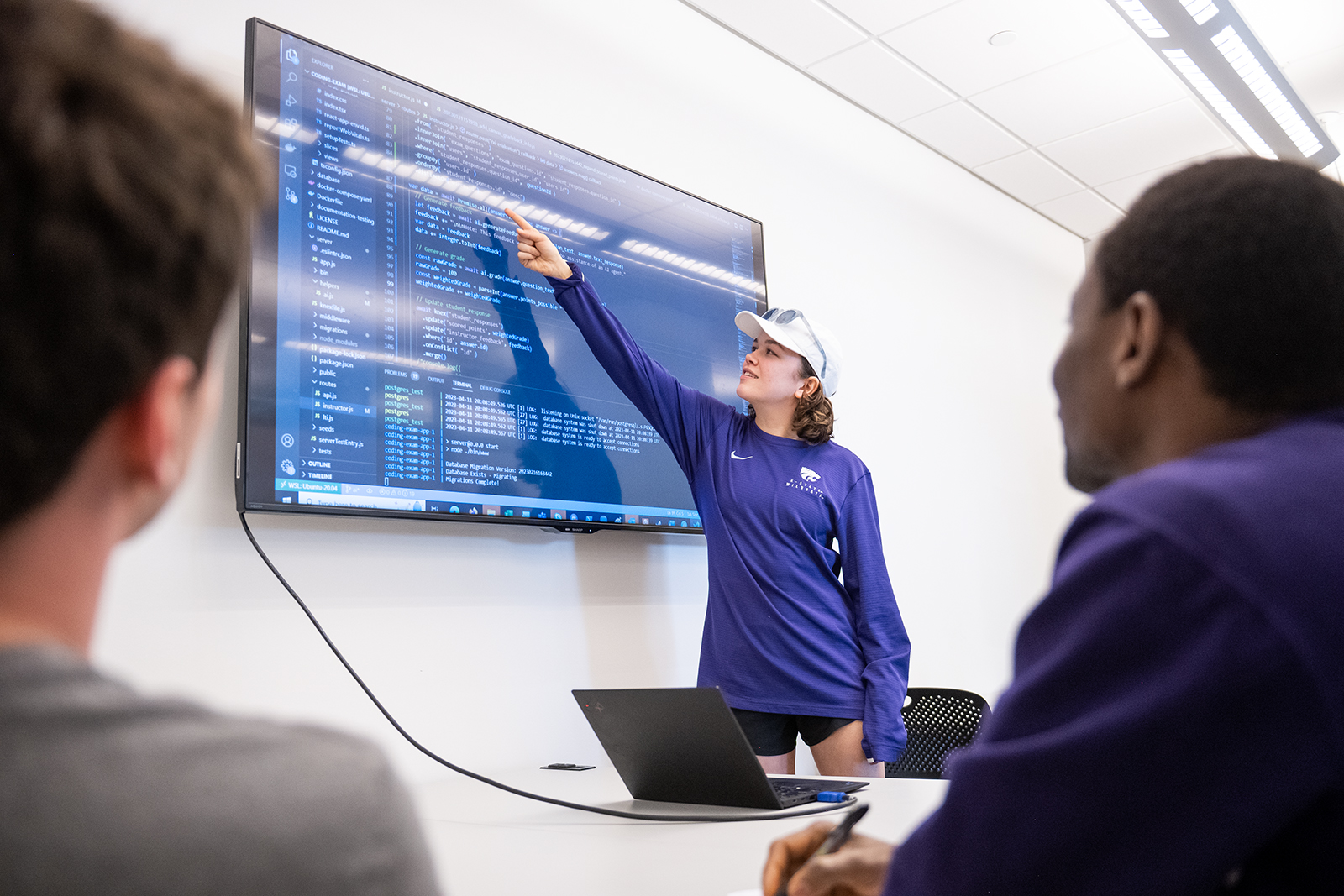Kansas needs qualified computer science teachers. This K-State program delivers — for free.
K-State's Cyber Pipeline program offers robust computer science education training to Kansas high school teachers for little to no cost.
 K-State's Cyber Pipeline program works to prepare Kansas teachers to fulfill new education requirements to offer computer science courses to high school students all across the state. | Download this photo.
K-State's Cyber Pipeline program works to prepare Kansas teachers to fulfill new education requirements to offer computer science courses to high school students all across the state. | Download this photo.
 By Grant Guggisberg
By Grant Guggisberg
Carl R. Ice College of Engineering Communications and Marketing
Wednesday, Feb. 19, 2025
MANHATTAN — When Josh Weese completed high school nearly 20 years ago, his exposure to computer science had been a short unit on robotics in shop class and some basic HTML coding and word processing in business class.
Today, he's working to bring more robust computer science education to districts large and small all across the state through Kansas State University's Cyber Pipeline.
Weese, a teaching associate professor of computer science in the Carl R. Ice College of Engineering and a Kevin and Jacquie Elmore – Carl and Mary Ice Cornerstone teaching scholar, co-directs the Advancing Learning and Teaching in Computer Science, or ALT+CS, laboratory with Nathan Bean, teaching associate professor of computer science, and Russell Feldhausen, instructor of computer science.
The ALT+CS lab collaborated with David Allen, associate professor of curriculum and instruction and director of the Center for STEAM Education, and the Rural Education Center to start the Cyber Pipeline program as a way to prepare Kansas teachers to fulfill new education requirements to offer computer science courses, which up until 2022 had been optional.
Using grant funding from the state of Kansas, the team developed a new graduate certificate in computer science education that equips existing teachers with the skills needed to teach computer science anywhere across the state.
"The certificate courses cover freshman- and sophomore-level computer science concepts, but with graduate-level teacher preparation concepts," Weese said. "It's kind of the marrying of the two fields, where the teachers learn how to do the fundamental computer science things, learning to program and all of that, but also the pedagogy behind it so they can turn around and teach it."
Creating the next generation of Kansas computer scientists
In 2022, Gov. Laura Kelly signed the Promoting Advancement in Computing Knowledge, or PACK, Act, which aims to increase the availability of computer science education in Kansas schools. It requires schools in Kansas to offer a quality computer science class for students and allows the class to count toward graduation requirements.
"It doesn't require students to take the computer science course," Weese said, "but we're at least to the point where every school has to offer it."
Alongside the new law came $1 million per year of grant funding for professional development providers to initiate the process of retraining existing teachers to offer this new curriculum. The Cyber Pipeline program has received approximately $1.9 million of these funds.
Kansas does not currently have a specific credential or endorsement for computer science, so teachers offering the courses work in existing school departments such as math or business or specifically as STEM specialists.
Weese said the group is also working on preparing undergraduate programs at K-State aimed at new teachers entering the field, giving them the chance to start their teaching careers with a computer science endorsement once one is created.
 Since it began a few years ago, K-State's Cyber Pipeline program has partnered with 104 districts across Kansas, 60 of which are classified as rural districts. | Download this photo.
Since it began a few years ago, K-State's Cyber Pipeline program has partnered with 104 districts across Kansas, 60 of which are classified as rural districts. | Download this photo.
"We want to have a steady stream of new teachers who are graduating from K-State trained in computer science education and prepared to teach in schools from the start, rather than only relying on teachers that are already credentialed and training them on a new subject," Weese said.
In addition to training teachers, the Cyber Pipeline also serves school districts by making course materials available at minimal cost.
"We provide an undergraduate version of those courses to school districts for free," Weese said. "All of the curriculum, all the assignments and rubrics, the open-source textbook — everything you would need to run a course is offered to them for free."
Since starting the program, Cyber Pipeline has involved 104 districts across Kansas thus far, 60 of which are classified as rural districts.
Additionally, the group is piloting a dual-credit enrollment for a pair of courses and working to expand access to the AP Computer Science exam so students can come to college with existing credits in computer science.
Bringing computer science to rural Kansas schools
While some of the state's largest districts have dedicated computer science teachers who have decades of experience teaching their curriculum, smaller districts with tighter budgets have had a more difficult time finding the money to teach these new skills.
For Weese, this problem was personal.
"I'm from a very rural school district myself, which is how our lab got involved with this," Weese said. "We're all from rural school districts and know how limited resources can be. Digital literacy, or the ability to use computers in your daily life, is still highly important for students to learn in K-12 districts. But many students have not had exposure to the concepts we would consider computer science, like how a computer works or how you write a program."
The Cyber Pipeline program has received nearly $300,000 in National Science Foundation funding for rural computer science education, and the group also has received more than $3 million in private donor funds for expanding rural education initiatives, which have been used to offset the cost of the browser-based online teaching platform used in the curriculum.

Weese said one of the issues facing rural communities is the perception of computer science as incompatible with rural life.
"We're trying to push the idea that computer science is a valid career for rural communities," he said. "Depending on the company you work for, many times you can work remotely and make a very high salary regardless of where you choose to live."
Ultimately, Weese stressed that computer science is a modern skill worth learning for everyone. A primary goal is to eventually have every Kansas high school student graduate with a solid foundation in computer science.
"We know that not everyone is going to want to be a computer scientist, and that's totally fine," Weese said. "But even if you pursue a career in agriculture or business or finance, knowing a little bit of computer science and some basic programming will go a long way in making your life a lot easier in any industry."
###
Website: Cyber Pipeline
Written by: Grant Guggisberg, grantg@k-state.edu
Get K-State news in your inbox
Subscribe to receive K-State news directly to your inbox every Monday.